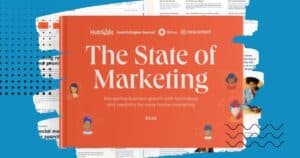As marketers and business owners, we tend to put out a lot of noise in an attempt to gain the attention of consumers.
However, because they have become smarter, they have learned to better ignore what we are throwing at them.
To be successful, you will want to make sure to get around that noise so that you’re delivering engaging and relevant content to your consumers, increasing the chances of a top-notch user experience that will last.
Your primary goal is to provide value to your users, making them feel like a person so they’ll come back to you over and over again.
One way you can do this is with predictive intelligence, which is essentially artificial intelligence.
Predictive intelligence is powerful and can change the way you fuel your content strategy and overall marketing campaign.
Want to know how? Keep reading to find out.
What is Predictive Intelligence?
Predictive intelligence sounds like something that should be set in the future, right?
Well, things are becoming more futuristic day after day, so we might as well take advantage of the way things are headed.
Predictive intelligence is a form of artificial intelligence that consists of a variety of analytics, statistics, algorithms, data mining, machine learning, and automation to identify behavior patterns and trends.
Basically, predictive intelligence allows us to predict the behavior of customers so that we are able to provide them with the best possible experience.
It can evaluate a company’s purchase trends and forecast potential future purchases by customers.
In case you’re still confused about what predictive intelligence is, here’s an example.
If an online shopper recently purchased a laptop or desktop computer, predictive intelligence tools would successfully detect this purchase and then send the consumer an e-mail — in real-time — suggesting the purchase of a computer desk, laptop desk, or laptop tray.
Ultimately, this eliminates any manual need to evaluate the profile of the customer and creates a far more effective and efficient marketing campaign overall.
Why Does Your Business Need Predictive Intelligence?
Personalized experiences for customers are always key to the success of a business.
Continuous research shows that a consumer prefers a more customized experience. In fact, many consumers will pay more for it.
Personalized marketing can be achieved through predictive intelligence.
This is because predictive intelligence uses past trends and previous customer behaviors to help predict potential future behavior, which allows more personalized marketing campaigns.
What Are the Benefits of Predictive Intelligence?
Aside from personalized user experiences and being able to plan ahead and predict future trends, there are numerous other benefits to using predictive intelligence in your digital marketing strategy.
Here are a few of them:
Save Time and Effort
Businesses spend a significant amount of time day in and day out trying to make low-risk decisions regarding their marketing campaigns.
With predictive intelligence, employees can have more time to spend on other more important business tasks.
All in all, it can take a lot off of their plates and create a much more productive workplace.
Detect Fraud
Due to the fact that predictive intelligence focuses on recognizing trends, patterns, and behaviors, it has the ability to detect when something is abnormal and out of place.
As a result, unusual patterns of behaviors can easily be detected. This is important because they could be a sign of fraud.
Analyze Text
Free text, which is the text that is typed into the fields on a Google form survey, or customer review, can be helpful information.
However, this type of qualitative data is difficult to process, especially when compared to numbers, due to the simple fact that it can vary so much in form and structure.
Luckily, predictive intelligence is capable of identifying word clusters and phrases that represent certain ideas and emotions.
It can then simplify and analyze them so that you can better understand them.
Overall, predictive intelligence takes the guesswork out of just about everything, allowing you to:
- Make more accurate predictions regarding your customers.
- Prepare for changes in market conditions.
- Develop improved and more customer-directed messaging for your marketing campaigns.
How Predictive Intelligence Fuels Your Content Strategy
In the world of content marketing, it can be difficult to keep up with the demand for quality, informative content that your customers need and want.
Luckily, predictive intelligence can help by fueling your content strategy. But how does that work?
It gives you the best insights
Essentially, predictive intelligence works by closely analyzing consumer data and providing insights into the tones, subjects, and content types that your target audience most often responds to.
It takes a lot of time and effort to create top-notch content on a regular basis, especially content that your audience wants to read.
Because of this, the insights that you can obtain from predictive intelligence are key to an efficient and streamlined content creation and marketing strategy.
For instance, you will obtain insights as to:
- What type of content is being written about by your competitors.
- Which trends are currently or most likely to go viral.
- What your audience wants to read at any particular moment in time.
It helps you become more creative and strategic
Content is not created simply so you have words on a page.
The primary goal behind the content is to help move your customers through the stages of awareness, increasing the chances that they’ll purchase your product or service.
Predictive intelligence can help with the creation of relevant content for each stage of the marketing funnel.
For instance, you may obtain insights into:
- What your audience wants to read.
- Concerns they may have with your product/service.
- Questions they may have and want/need to be answered.
Being equipped with this type of knowledge that you didn’t have before, you can create relevant, first-rate content that is desired by your audience and is more likely to help them convert.
How to Implement Predictive Intelligence
Predictive intelligence can be used on your website, in e-mail campaigns, in SEO, through advertising efforts, in research, and much more.
Regardless of how you decide to implement predictive intelligence, it is a very strategic marketing decision on your part.
Here are three ways in which you can implement predictive intelligence:
1. Chatbots
Chatbots are increasing in popularity, and thanks to advancements in technology and artificial intelligence, they have become better at providing more accurate answers to customers.
Many customers don’t like to peruse a FAQ page for the answers they need, nor do they want to call and spend 30 minutes waiting to speak to someone.
With a chatbot, which is an automated form of predictive intelligence, customers can get the answers to their questions in real-time.
Statistics show that chatbots handle nearly 70 percent of all chats from start to finish.
2. E-mails
You probably already take part in some form of e-mail marketing, as it is one of the most well-known, effective forms of marketing.
However, you must take the time to personalize these e-mails or consumers won’t give them a second glance.
This is where predictive intelligence comes in and makes things a bit easier for you.
Take an abandoned cart e-mail for example. When a customer puts something in their cart and then leaves the page, an automation platform can send the customer a follow-up e-mail after a set amount of time that reminds them to complete their purchase.
Abandoned cart e-mails are a good place to start your marketing automation, especially if you are seeing a lot of abandoned carts.
And, if you are, you aren’t alone, as nearly 70 percent of online carts are abandoned.
When an abandoned cart e-mail is sent:
- 45% of them are opened.
- 50% of these opened e-mails are clicked on.
- 50% of the consumers who clicked move forward with their purchase.
3. Intelligent Apps
Intelligent applications have AI embedded within them, which gives them the ability to act intelligently on any feedback that they receive.
With the ability to be used in both the B2B and B2C industries, these apps are able to learn, discover, and adapt to various patterns of user behavior.
The more the app is used, the more it learns about the user and is able to use predictive intelligence to adapt to the environment and the ongoing information it receives.
These apps are data-driven, action-oriented, and responsive, unlocking the potential to make life easier for the user, help the business gain position in the market, and help make more informed business decisions.
Some popular examples of intelligent apps include Siri, Google Assistant, Alexa, and Cortana.
These intelligent apps are designed to deliver a personalized user experience, which is a primary focus of predictive intelligence and should always be a main focus of yours in your marketing campaign.
Wrap Up: Why You Need Predictive Intelligence Sooner Rather Than Later
AI tools have the capability of scanning through millions of events and tasks to identify potential patterns and behaviors that you simply could not notice or track on your own.
Therefore, it is far more efficient and effective, but it doesn’t mean that your human relationships should go on the back burner.
Ultimately, predictive intelligence ensures the customer and the customer experience are the priority. It allows you to take care of the customer’s needs in real-time.
As a result, there is an increased chance that the customer will move through the buyer’s journey and make a purchase.
This is particularly true when it is paired with a solid marketing strategy.
If you have been struggling with sales, you may benefit from predictive intelligence. And if you would like to learn more about the role of AI in marketing, check out our recorded jam session!









